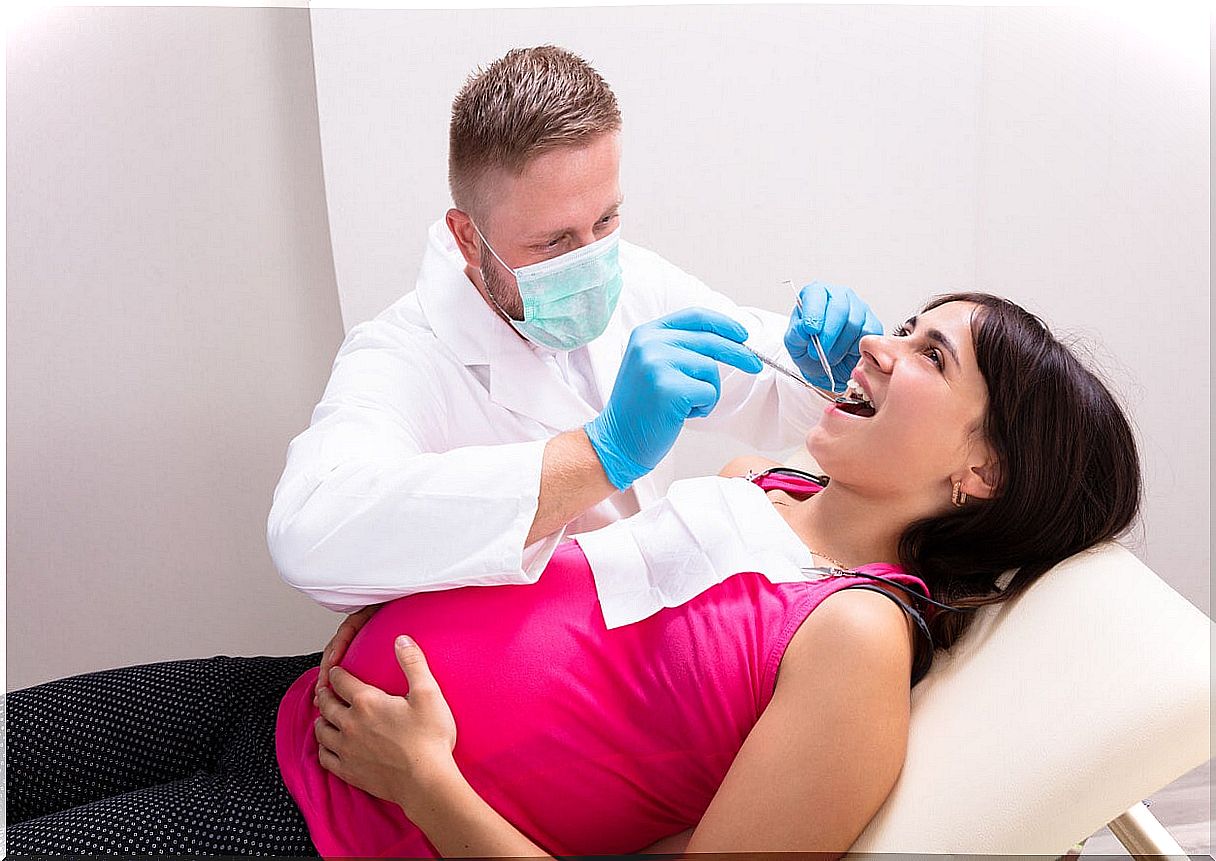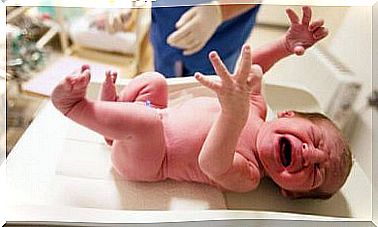Sensitive Teeth During Pregnancy: How To Act

Oral health care in pregnant women is very important, since hormonal changes can increase the risk of suffering from some ailments in the mouth. Sensitive teeth during pregnancy are a fairly common problem, for example.
It is an intense, short, but very annoying pain that is felt in some teeth when taking something very cold or very hot. In general, this is not serious and good oral hygiene can reduce symptoms.
The state of oral health impacts the general health of the mother and influences the gestation period. Some basic oral hygiene and nutritional care can make a difference and reduce the risk of complications.
Suffering from sensitive teeth during pregnancy is uncomfortable and unpleasant. In the following lines we will tell you what it is due to and how it can be solved.
Causes of sensitive teeth during pregnancy
Hormonal changes that occur during pregnancy are responsible for most of the conditions in this state. Sensitive teeth during pregnancy are also due to these variations in the mother’s hormones and behaviors. Here are some of the reasons that can cause tooth pain during pregnancy.

Hormonal changes
As we mentioned, during pregnancy the levels of progesterone and estrogens increase, which increases blood flow throughout the body. Increased circulation to the gums makes them more susceptible to inflammation, swelling, and bleeding. This alteration in the gingival tissue can cause sensitivity in the dental elements.
Bacterial plaque
The accumulation of bacteria on the gums due to faulty hygiene, added to the susceptibility of the gingival tissue to the inflammation that has already been mentioned, increases the sensitivity problem. Pregnancy gingivitis is a very common condition at this stage and is caused by the presence of bacterial plaque on the gums.
Periodontal disease
Periodontal disease is about the infection of the supporting tissues of the tooth that, as we have already said, for hormonal reasons, respond in an exaggerated way. If gingivitis is not treated and the infection is not controlled in time, the evolution will be the loss of bone material and the rupture of the periodontal fibers.
This generates a consequent dental mobility and even the loss of pieces. Sensitivity is one of the symptoms of this condition. In addition, the condition increases the risk of pregnancy complications, such as contractions, premature deliveries and low birth weight children.
Exposed roots
Inflammatory changes in the gums can cause the gums to recede and leave part of the tooth root exposed. Thus, the protective function of the gingival tissue is lost.
An area of the dental element that is not prepared for this is left in contact with the outside. Any stimulus on the tooth will result in sensitivity or pain.
Gum tumors
Some women with gingivitis and a lot of plaque build-up develop a tumor on the gingival tissue. It is known by the name of pyogenic granuloma or epulis of pregnancy . It is a painful and very bleeding gum growth. It makes chewing, feeding, speaking and aesthetics difficult. Sensitivity in neighboring parts is also a symptom.
Although their appearance is scary, they are benign and disappear after delivery. In any case, for the mother’s comfort it is a good idea to go to the dentist for its removal.
Cavities
The presence of this disease in some tooth can manifest as sensitivity in the teeth. Changes in diet and the preference for sugary foods as cravings favor the formation and progression of the pathology.
Poor dental hygiene, especially in women with nausea during brushing, predisposes it to manifest. The dry mouth typical of pregnancy is also a risk factor.
How to deal with sensitive teeth during pregnancy?
Although there are some interventions and products that cannot be used during pregnancy, tooth sensitivity must be treated. Not only because of the discomfort it causes in the mother, who cannot feed or rest properly, but also because of the risk of producing contractions and other complications.
Here are some tips to solve the problem of sensitive teeth during pregnancy:

- Carry out proper dental hygiene : brushing is vital to control the bacterial plaque that causes or worsens this ailment. All the faces of the dental elements and the gums should be brushed with gentle movements, with a soft bristle brush. Cleaning should be supplemented with dental floss, fluoride pastes, and mouthwashes if recommended by the dentist.
- Control your diet : a varied, nutritious and balanced diet is vital for a healthy pregnancy. Avoiding sweet, spicy, very cold, and very hot foods helps prevent sensitive teeth during pregnancy.
- Visiting the dentist : going to the dentist before any symptoms of sensitivity is key to solving it and slowing the advance of the ailment that originates it. Dental exams every three months are of great help to detect and solve any problems early. Fluoride topications, professional cleanings and the indication of a special mouthwash are sometimes necessary to treat sensitive teeth during pregnancy. In the event that any other intervention is needed, such as fillings, extractions or root canals, the dentist will indicate the most opportune moment to perform them.
Keeping your mouth healthy to avoid sensitive teeth during pregnancy
Pregnancy is a time of change, both internal and external, for women. Paying attention to oral health is essential to avoid the complications and discomfort that appear at this stage. With proper mouth care and regular dental visits, sensitive teeth during pregnancy will not be a problem.










